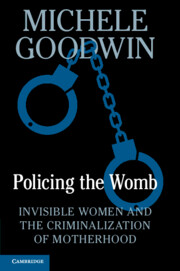Book contents
- Policing the Womb
- Policing the Womb
- Copyright page
- Dedication
- Contents
- Preface
- Acknowledgments
- 1 Introduction
- 2 Pregnancy and State Power
- 3 Creeping Criminalization of Pregnancy across the United States
- 4 Abortion Law
- 5 Changing Roles of Doctors and Nurses: Hospital Snitches and Police Informants
- 6 Revisiting the Fiduciary Relationship
- 7 Creating Criminals: Race, Stereotypes, and Collateral Damage
- 8 The Pregnancy Penalty: When the State Gets It Wrong
- 9 Policing Beyond the Border
- 10 Lessons for Law and Society: A Reproductive Justice New Deal or Bill of Rights
- 11 Conclusion
- Epilogue
- Notes
- Select Bibliography
- Index
4 - Abortion Law
Published online by Cambridge University Press: 07 February 2020
- Policing the Womb
- Policing the Womb
- Copyright page
- Dedication
- Contents
- Preface
- Acknowledgments
- 1 Introduction
- 2 Pregnancy and State Power
- 3 Creeping Criminalization of Pregnancy across the United States
- 4 Abortion Law
- 5 Changing Roles of Doctors and Nurses: Hospital Snitches and Police Informants
- 6 Revisiting the Fiduciary Relationship
- 7 Creating Criminals: Race, Stereotypes, and Collateral Damage
- 8 The Pregnancy Penalty: When the State Gets It Wrong
- 9 Policing Beyond the Border
- 10 Lessons for Law and Society: A Reproductive Justice New Deal or Bill of Rights
- 11 Conclusion
- Epilogue
- Notes
- Select Bibliography
- Index
Summary
The battle over women’s autonomy, especially their reproductive healthcare and decision-making, has always been about much more than simply women’s health and safety. Rather, male power, control, and dominion over women’s reproduction historically served political purposes and entrenched social and cultural norms that framed women’s capacities almost exclusively as service to a husband, mothering, reproducing, and sexual chattel. For example, tort law carved out specific remedies for husbands who suffered the loss of their wives’ servitude and sex under the loss of consortium cause of action. Historically, loss of consortium litigation provided economic remedies only for husbands. This law derives from the legal premise that the husband is the master of the wife. She is his servant. Thus, when wives suffered a physical injury, husbands could file suit against third parties for the “loss” of their wives’ servitude, companionship, and sex. Most Black women, their mothers, and daughters encountered or directly suffered the physical norms and conditions of that cruel enterprise, including physical bondage, food deprivation, and physical torture (whippings, brining, and amputations of fingers and toes). They also endured reproductive coercion and terror, including sexual assaults, rapes, forced reproduction, and stripping away of offspring.
- Type
- Chapter
- Information
- Policing the WombInvisible Women and the Criminalization of Motherhood, pp. 46 - 77Publisher: Cambridge University PressPrint publication year: 2020
- 1
- Cited by

